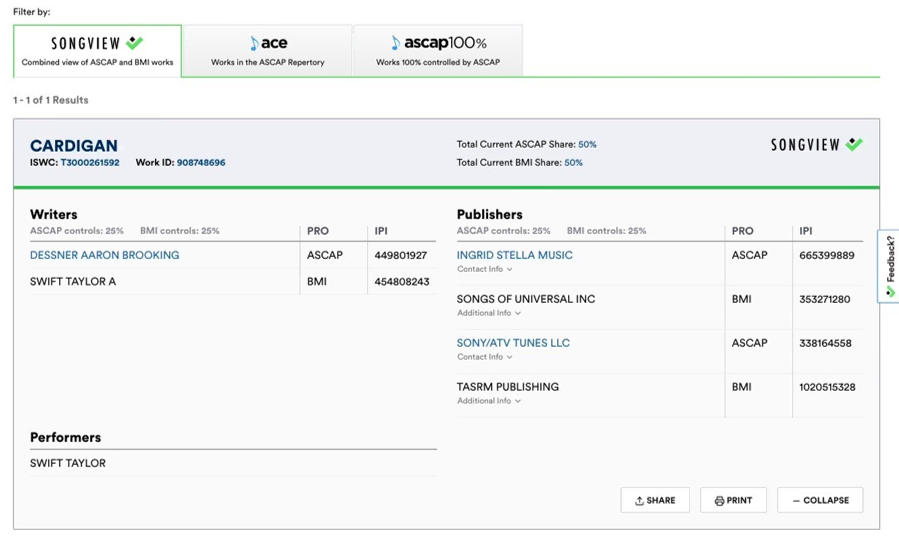Two of the nation’s leading performing rights organizations — ASCAP and BMI — joined forces to create a new song data platform called Songview. The platform provides an aggregated, comprehensive view of copyright ownership and administration shares for more than 20 million musical works. The data is accessible to the public for free on both ASCAP’s and BMI’s websites.
To help you understand why this is such a nice belated Christmas present from ASCAP and BMI, here’s a super quick refresher on public performance rights:
When a song is played publicly (on the radio, online, in a venue, on television, in a commercial), whoever owns the copyright in that composition has to be paid. Copyright holders outsource the administration and oversight of their public performance rights to performance-rights organizations, or PROs, which collect and distribute performance royalties. Entities (including television networks, radio stations, arenas, bars, restaurants, etc) that publicly perform music pay the PROs a fee for the right to use the music in that PRO’s repertory. The PROs take a cut of this fee and distribute the rest to the songwriters, composers, and music publishers in their memberships.
Previously, if you wanted to know who owned a piece of music and which PRO administered the associated public performance rights, you would have to check with each PRO separately—BMI would have info on BMI songs, and ASCAP would have info on ASCAP songs. Now, when you go to search BMI or ASCAP, you will have the option to see aggregated music data through Songview, including ownership and control splits across the two PROs. Here’s how data relating to “Cardigan” by Taylor Swift is shown in Songview on ASCAP's website (courtesy of Billboard):

Shares owned by PROs other than BMI and ASCAP will either appear as “Other” on Songview, or the ASCAP and BMI controlling percentages will not add up to 100, indicating that another PRO has a share in the composition.
Songview is a huge step towards having a centralized music database in the United States and will make it easier for music industry folks (and advertisers) to ascertain who controls what rights in a piece of music.

/Passle/5a0ef6743d9476135040a30c/SearchServiceImages/2026-03-02-15-44-59-583-69a5b07bfe4ddbcd496d2bf1.jpg)
/Passle/5a0ef6743d9476135040a30c/MediaLibrary/Images/2026-02-28-23-34-09-665-69a37b71b4761ae8f05112dd.png)
/Passle/5a0ef6743d9476135040a30c/MediaLibrary/Images/2026-02-23-22-36-48-266-699cd680304bae27518b0c0e.png)
/Passle/5a0ef6743d9476135040a30c/MediaLibrary/Images/2026-02-23-22-32-15-805-699cd56f994bc9b52c44e804.png)